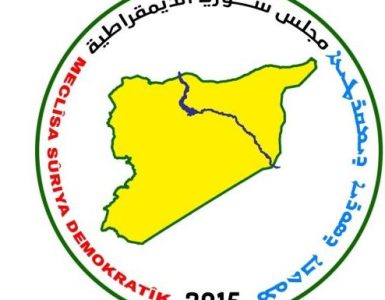By Ali Rahmoun
For more than 13 years, the Syrian crisis has remained intractable. The reasons for this situation are numerous and multifaceted, primarily due to the country’s division as a result of foreign military and political interventions, multiple local conflicts, and the fragmentation of the Syrian opposition. The ruling regime has pursued policies of repression, marginalization, and discrimination for decades. Also, it has contributed to the division of the Syrian society based on sectarian, ethnic, and religious terms. The popular demands resulting from the Syrian revolution in 2011 were met with violence. That situation has led to a counter-violence and ongoing conflicts.
Therefore, Syrians urgently need a Syrian national project. This project should be based on a strong foundation and works to fulfill Syrians’ aspirations, without any exclusion, marginalization, or discrimination. The Syrian Democratic Path launched its political project at a founding conference in Brussels. A group of democratic powers and figures attended that conference to reorganize and revitalize political action and to shape a better future for Syria’s future amid a complex situation and significant challenges.
Also: The Democratic Path Conference Will Be a Turning Point in Shaping Syria’s Future
This new path is the outcome of tireless work and meaningful discussions aimed at uniting various political powers. As the Syrian political landscape suffers from the fragmentation of democratic powers and their weakened influence. Moreover, numerous independent political figures lack formal organizational support, limiting their influence on the overall political situation.
The intellectual and political basics of the path developed following a series of consultative meetings in the Swedish capital, Stockholm. Thus, the Stockholm Path was emerged, and a preparatory committee was formed to engage in dialogue with various political powers and independent figures.
Reactions to the Path were notably varied. Some powers responded seriously to the attendance invitation, agreeing to participate, while others ignored the calls for their own reasons. Additionally, some of powers refused to participate in the conference due to pressure by external entities. It is worth mentioning that all powers agreed with the overall goals and principles.
After nearly two years of tireless efforts to engage with political powers and independent figures, the founding conference of the Syrian Democratic Path was successfully held in Brussels, Belgium. The conference was attended by 128 democratic figures representing political blocs and independent democrats. Over two days, the conference discussed the project’s documents, the democratic path’s vision for Syria, and the prospects for a solution based on fundamental principles and foundations. At the end of the conference, a general secretariat was elected.
The Democratic Path has presented a comprehensive vision for Syria’s future, based on vital principles such as national unity and an inclusive Syrian identity. The diversity of the Syrian society, including Arab, Kurdish, Syriac, Assyrian, Armenian, Turkmen, Circassian, and other components represents a rich cultural heritage. A new social contract is essential to unify these diverse identities. This contract should reflect Syria’s unique social fabric and provide a political framework to mobilize and empower its citizens.
This diversity enriches Syria’s cultural, intellectual, and economic fabric, enhancing its civilizational status.
The Path has proposed meaningful solutions for the presented issues. Furthermore, it has advocated for decentralization as a means of addressing historical and developmental challenges, particularly the Kurdish question. It emphasizes the need for a just resolution that guarantees the legitimate rights of the Kurdish people in accordance with international human rights laws and principles. Decentralization would promote the establishment of a just and inclusive state. Such a state that would respect the diverse identities and aspirations of all Syrians. Moreover, it would prevent the resurgence of authoritarian rule.
Also: Democratic Powers Seek Holding a Vital Conference for Syria’s Unity
Additionally, the Path stresses the importance of separation of powers. As it emphasizes the secularism and adherence to international resolutions, especially UN Security Council Resolution 2254, which outlines a roadmap for a political solution and democratic transition in Syria. It underscores the need for a modern constitution based on international human rights law.
This democratic path emerges amidst complex regional and international challenges. There are factors that necessitate a reassessment and adaptation of political approaches.
These factors are as follows:
– The Russo-Ukrainian war.
– The Israeli-Palestinian conflict, particularly in Gaza, and its repercussions on Lebanon and Hezbollah.
– The escalating tensions between Iran and Israel with the possibility of its extension to Syria.
– Turkey’s military interventions in Syrian territory, particularly in NE Syria, with the aim of consolidating its occupation.
The Syrian Democratic Path relies on the ability of Syrians to overcome their divisions in the Syrian society and establish their national project. The better future for Syria should be determined and shaped by Syrians themselves. This will be achieved through engaging in an inclusive national dialogue that will pave the way for a national conference to establish a democratic, pluralistic, and decentralized state. This path is open to all, rejecting any form of monopoly, privilege, or exclusion. It is based on the principle of engaging in the national dialogue with all parties. The aim is to reach agreements, alliances, and joint work to establish a political and social entity that reflects the aspirations of the Syrian people.
The General Secretariat of the Syrian Democratic Path is committed to organizing the Path and developing a roadmap towards a comprehensive national conference, aiming to build a better future for Syria.




